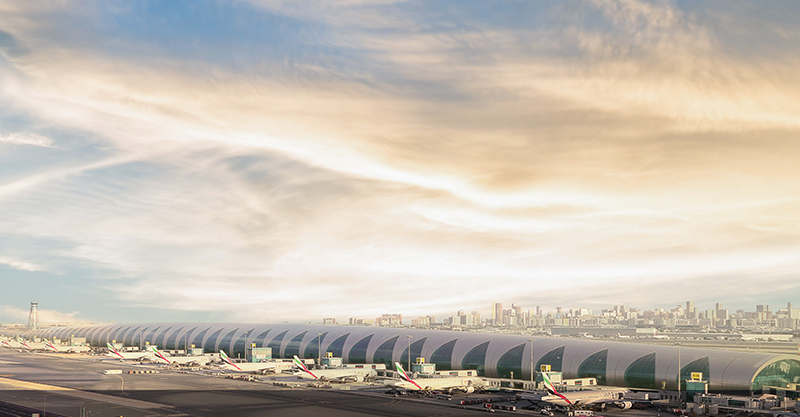Emirates Group posts USD6 billion losses in 2021 as passenger traffic dipped by 88% due to the pandemic
DUBAI: Emirates carried only 6.6 million passengers in 2020, down by 88%, as the pandemic ravaged the global aviation industry causing the airline’s parent company, Emirates Group, to incur annual losses of AED 22.1 billion (USD 6 billion), its first non-profitable year in more than three decades.
During the same period, Emirates SkyCargo, meanwhile, put in a stellar performance by rapidly responding to new demand in a changed global marketplace, contributing to 60% of the airline’s total transport revenue. It quickly scaled up operations and rebuilt its cargo network to meet strong demand from shippers who faced a capacity crunch when the pandemic forced airlines to drastically reduce flights.
With no flights and airport activities, dnata reported a loss of AED 1.8 billion (USD 496 million) down from AED 618 million (USD 168 million) profit in the previous year.
In a statement detailing highlights of the Group’s 2020-21 Annual Report, His Highness Sheikh Ahmed bin Saeed Al Maktoum, Chairman and Chief Executive, Emirates Airline and Group, said: “The COVID-19 pandemic continues to take a tremendous toll on human lives, communities, economies, and on the aviation and travel industry. In 2020-21, Emirates and dnata were hit hard by the drop in demand for international air travel as countries closed their borders and imposed stringent travel restrictions.
“Our top priorities throughout the year were: the health and wellbeing of our people and customers, preserving cash and controlling costs, and restoring our operations safely and sustainably. Emirates received a capital injection of AED 11.3 billion (US$ 3.1 billion) from our ultimate shareholder, the Government of Dubai, and dnata tapped on various industry support programs and availed a total relief of nearly AED 800 million in 2020-21. These helped us sustain operations and retain the vast majority of our talent pool. Unfortunately, we still had to make the difficult decision to resize our workforce in line with reduced operational requirements.”
For the first time in the Group’s history, redundancies were implemented across all parts of the business. As a result, the Group’s total workforce reduced by 31% to 75,145 employees, representing over 160 different nationalities.
Keeping a tight control on costs, across the Group, financial obligations were restructured, contracts renegotiated, processes examined and operations consolidated. The various cost reduction initiatives returned an estimated saving of AED 7.7 billion during the year.
In 2020-21, the Group collectively invested AED 4.7 billion (US$ 1.3 billion) in new aircraft and facilities, the acquisition of companies, and the latest technologies to position the business for recovery and future growth. It also continued to invest resources towards environmental initiatives, as well as supporting communities and incubator programs that nurture talent and innovation to drive future industry growth.
“No one knows when the pandemic will be over, but we know recovery will be patchy. Economies and companies that entered pandemic times in a strong position, will be better placed to bounce back. Until 2020-21, Emirates and dnata have had a track record of growth and profitability, based on solid business models, steady investments in capability and infrastructure, a strong drive for innovation, and a deep talent pool led by a stable leadership team. These fundamental ingredients of our success remain unchanged. Together with Dubai’s undiminished ambitions to grow economic activity and build a city for the future, I am confident that Emirates and dnata will recover and be stronger than before,” said Sheikh Ahmed, adding that the Group aims to operate in full capacity as quickly as possible.
Emirates received three new A380 aircraft during the financial year and phased out 14 older aircraft comprising of 9 Boeing 777-300ERs and 5 A380s, leaving its total fleet count at 259 at the end of March. Emirates’ average fleet age remains at a youthful 7.3 years.
Emirates’ order book for 200 aircraft remains unchanged at this time. The airline is firmly committed to its long-standing strategy of operating a modern and efficient fleet, which underscores its “Fly Better” brand promise, as young aircraft are better for the environment, better for operations, and better for customers.
Working closely with aviation stakeholders to design and implement bio-safety measures, Emirates gradually restored its passenger network and hub connectivity from mid-June 2020 as the UAE re-opened for transit travellers and later for international arrivals.
During the year, Emirates reactivated its strategic codeshare partnership with flydubai, and entered into agreements with new partners TAP Air Portugal, FlySafair, and Airlink in South Africa, to expand connectivity for its customers.
From zero scheduled passenger flights at the start of the financial year, to operations in over 120 destinations by 31 March 2021, Emirates has shown its ability to adapt and respond to challenges, and the resilience of its people and business model.










